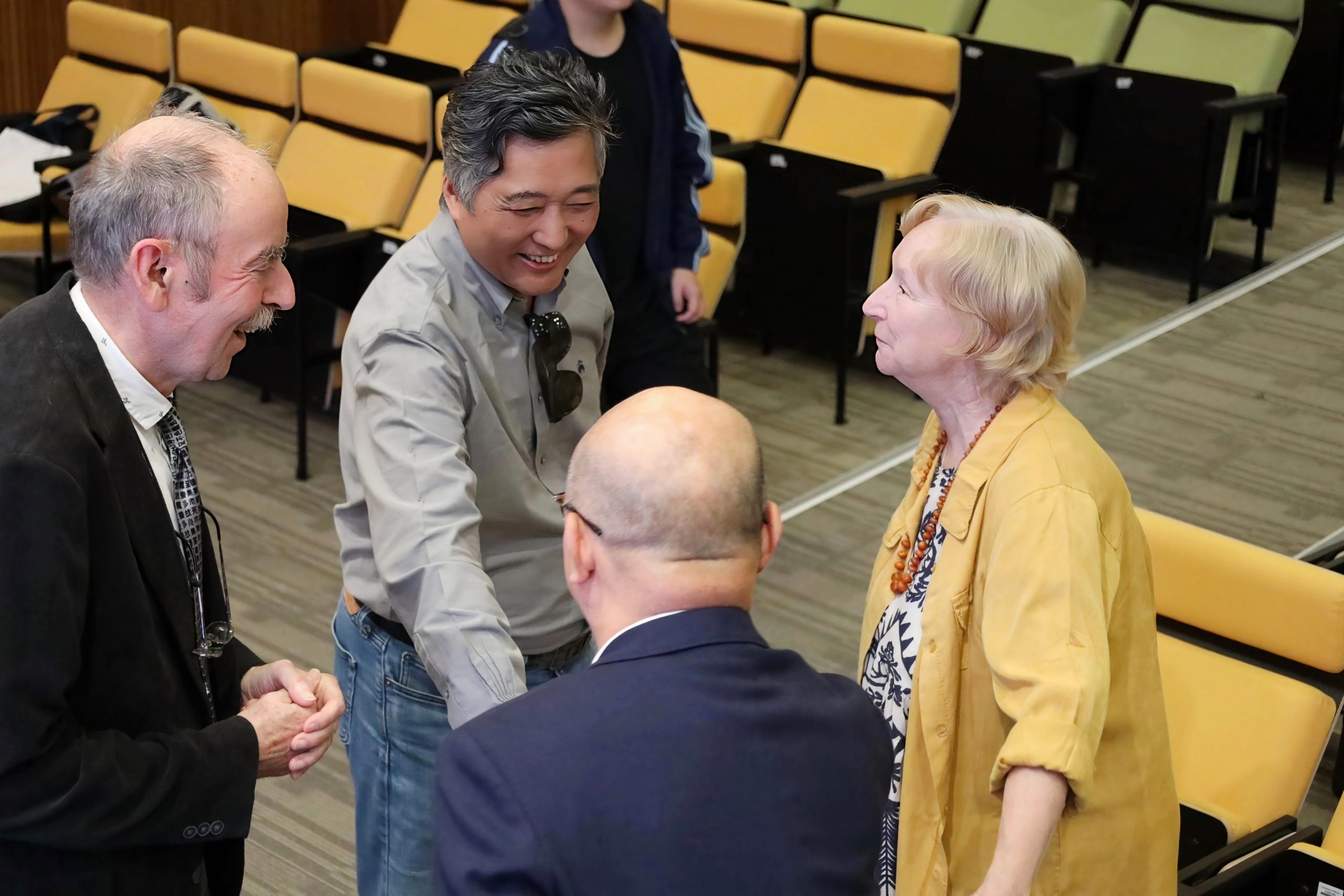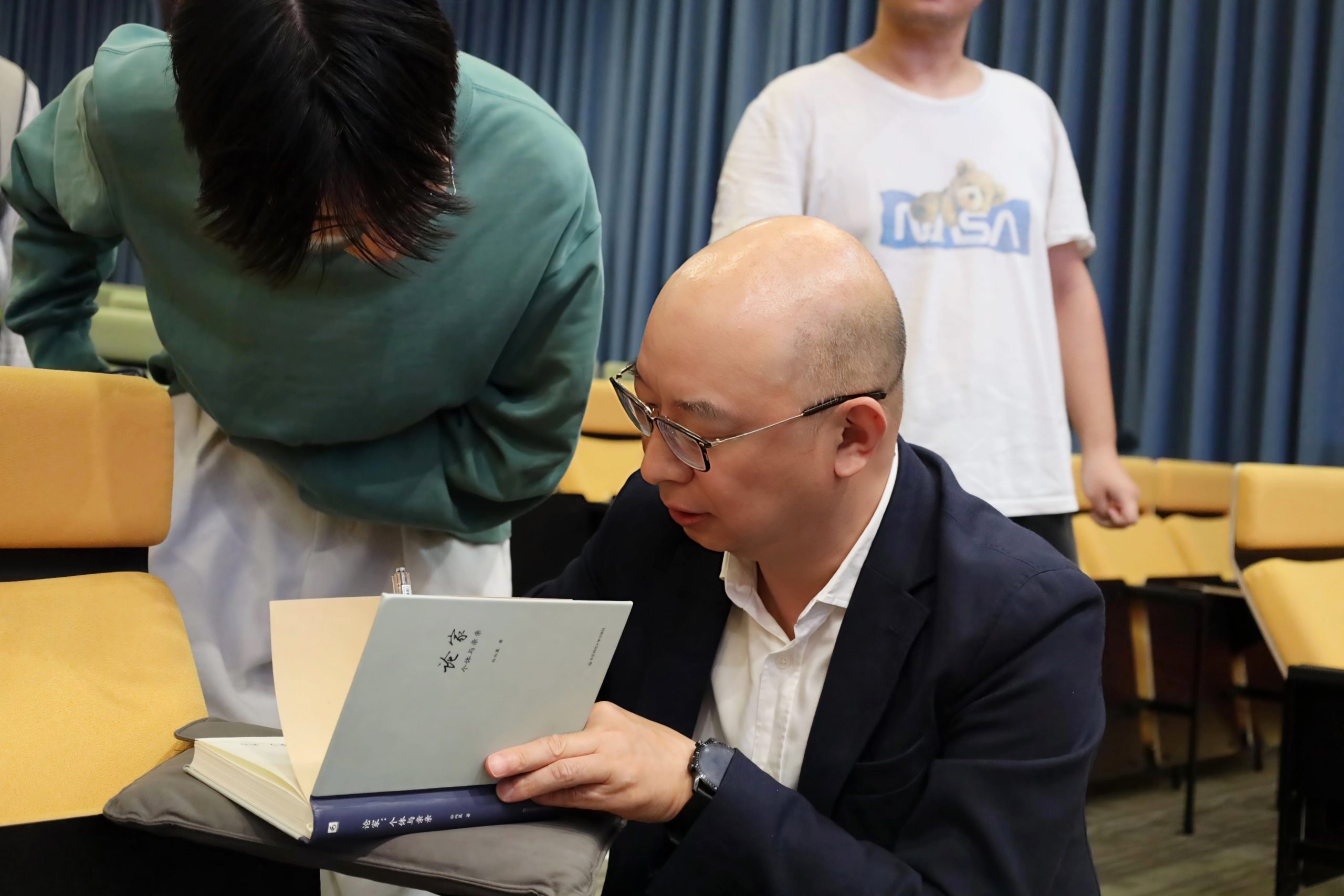【IAS】UM Philosophy Forum Distinguished Scholars Series – 9 was successfully held
【高研院】「澳大哲學名師系列講堂 - 9」順利舉行

| The IAS promotional video has been launched! We cordially invite you to watch and help spread the word! | ||
|
English |
|
中文 |
|
On the occasion of the fifth anniversary of the Institute for Advanced Studies in Humanities and Social Sciences at the University of Macau, we would like to express our gratitude for your unwavering support to us. Your involvement and support have helped build a strong foundation for our interdisciplinary research platform and inspired us to keep moving forward. The IAS is excited to carry on our mission, rooted in Macau, by organizing high-quality academic activities that showcase the diversity of academic collaboration. |
||
由澳門大學人文社科高等研究院(IAS)主辦、人文學院哲學與宗教學系協辦的「澳大哲學名師系列講堂—9」於2025年10月27日在澳大圖書館演講廳(E2-G012)順利舉行。是次講座邀請到德國特里爾大學榮休漢學教授卜松山主講,主題為《道其不可道者—中國傳統中的無知之智慧》。復旦大學哲學學院教授,復旦大學通識教育中心主任孫向晨教授與澳大人文學院哲學與宗教學系張穎教授擔任與談人,人文學院歷史系特聘教授兼高研院學術項目與刊物主任林少陽教授主持。
講座伊始,卜松山教授在講座中以「說出不可說」為主題,從語言與智慧的哲學悖論出發,探討西方與中國思想傳統如何理解「言說的限度」。他首先回顧西方哲學自柏拉圖至維根斯坦的思想脈絡,指出「不可言說」既揭示理性的邊界,也揭示智慧超越語言的維度。
隨後,卜教授轉向中國思想傳統,從道家與佛教視角闡述「不可說」之道。他引用《道德經》《莊子》《金剛經》與《維摩詰所說經》等典籍,指出中國思想傾向於以含蓄、暗示與詩意的表達方式揭示真理,強調「言外之意」與「無言之境」的美學與哲學價值。他認為,這種「不可說的美學」不是語言的缺席,而是一種更高層次的智慧體現,透過沉默與象徵傳達直覺的洞見。
講座亦延伸探討此種表達方式在中國藝術中的體現,從書法、詩歌到繪畫,空白與留白之間蘊含深遠意義。卜教授指出,理解「不可說」的智慧,對當代跨文化對話、倫理思考乃至數位時代的語言溝通皆具有啟發意義。
在討論環節中,孫向晨教授比較了西方哲學對「定義」的追求與中國思想中對謙遜、意象與關係性理解的重視。卜松山教授回應指出,儒、道、佛三家各具思想取向,而佛教在中國的發展體現了文化的創造性轉化。張穎教授則將「不可說」的主題與「否定神學」相聯繫,指出沉默與言說的張力在基督教、道教與佛教中呈現出不同的思想意涵。
本次講座吸引了眾多學者與學生踴躍參與,現場討論熱烈。澳大高研院將持續舉辦「澳大哲學名師系列講堂」,促進不同哲學傳統之間的對話,拓展人文與社會科學的學術視野與國際交流。
The UM Philosophy Forum Distinguished Scholars Series 9, co-organised by the Institute of Advanced Studies in Humanities and Social Sciences (IAS) and the Department of Philosophy and Religious Studies of the Faculty of Arts and Humanities (FAH), was successfully held on 27 October 2025 at the Library Auditorium (E2-G012), University of Macau. Professor Karl-Heinz Pohl, Professor Emeritus of Sinology at Trier University, Germany, delivered a thought-provoking lecture titled “To Speak the Unspeakable – The Wisdom of the Unsayable in the Chinese Tradition.” “Professor Xiangchen Sun, Professor of the School of Philosophy and Head of the Division of Humanities at Fudan University, and Professor Ellen Zhang, Professor in the Department of Philosophy and Religious Studies at the Faculty of Arts and Humanities, served as discussants. Meanwhile, Professor Shaoyang Lin, Head of Academic Programme and Publication at IAS and Distinguished Professor in the Department of History at the Faculty of Arts and Humanities, acted as the moderator.
At the beginning of the lecture, Professor Pohl explored the philosophical paradox of “speaking the unspeakable,” exploring the philosophical paradox of language and wisdom, and examining how Western and Chinese thought traditions understand the ‘limits of speech.’ He first reviewed the intellectual lineage of Western philosophy tracing it from Plato to Wittgenstein as he noted that the ‘unspeakable’ reveals not only the boundaries of reason but also the dimensions of wisdom that transcend language.
Subsequently, Professor Pohl turned to the Chinese philosophical tradition, focusing on the Daoist and Buddhist perspectives on the “unsayable.” Drawing upon texts such as the Daodejing and Zhuangzi, as well as the Diamond Sutra and Vimalakīrti Sutra, pointing out that Chinese thought tends to reveal truth through implicit, suggestive, and poetic expressions, emphasising the aesthetic and philosophical values of ‘meaning beyond words’ and ‘the realm of the unspoken.’ He argued that this ‘aesthetics of the unspeakable’ is not a mere absence of language but a higher manifestation of wisdom, conveying intuitive insights through silence and symbolism.
The lecture also extended to discuss how this mode of expression shaped Chinese culture, particularly in calligraphy, poetry, and painting, where the space between words and images carries profound meaning. Professor Pohl indicated that understanding the wisdom of the ‘unspeakable’ has enlightening implications for contemporary cross-cultural dialogue, ethical reflection, and even communication in the digital age.
During the discussion session, Professor Sun compared Western philosophy’s pursuit of definition with the emphasis in Chinese thought on humility, imagery, and relational understanding. Professor Pohl responded by outlining that Confucianism, Daoism, and Buddhism each possess distinct philosophical orientations, and that Buddhism’s development in China exemplifies a creative cultural transformation. Professor Zhang Ying connected the theme of the ‘unspeakable’ with ‘negative theology,’ noting that the tension between silence and speech presents different intellectual meanings in Christianity, Daoism, and Buddhism.
The event attracted enthusiastic participation from scholars and students across various disciplines, with lively on-site discussions. IAS will continue to organise its “UM Philosophy Forum Distinguished Scholars Series” to foster dialogue among different philosophical traditions and to broaden academic horizons and international exchanges in the humanities and social sciences.








